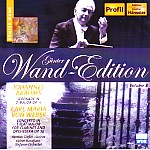This disc represents a valuable addition to the Wand discography. He was always a fine Brahms conductor, and his 1968 broadcast recording of the First Serenade has just the right bucolic quality, with swift tempos and a welcome emphasis on the composer’s luminous scoring for the woodwind section (such a shame he didn’t keep it up to the same degree in the symphonies). The only possible negative is the lack of an exposition repeat in the first movement–the music is so pretty that you want to hear it again, but otherwise Wand never sets a foot wrong. He paces the adagio at just the right point between action and lyrical contemplation, and you won’t hear the rustic second scherzo given a more rollicking reading anywhere. The finale also is impressive, with its obsessive dotted rhythms rendered accurately but not exaggerated to the point where the movement sounds like it has developed a nervous tic. Weber’s E-flat Clarinet Concerto amiably rounds out the disc. It’s well played by soloist Hermut Giesser, and of course the music is fresh and charming. The 1968 sonics in the Serenade are a touch boxy and compressed compared to what the WDR engineers routinely offer today, but this doesn’t detract significantly from the musical experience. [5/17/2006]
































